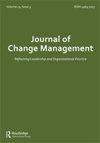Yes, We Can! A Job Embeddedness Perspective on Employee Change Acceptance
IF 3
Q2 MANAGEMENT
引用次数: 0
Abstract
ABSTRACTAlthough change is necessary for organizations to survive and thrive, research suggests many organizational change initiatives fail in their implementation. Fostering individual acceptance of change initiatives is thus vital to successful change implementation. This paper tests a model of individual change acceptance that posits the role of individual perceptions of their history with past organizational change as its primary antecedent. The results suggest that positive history with organizational change is associated with change acceptance via the mediating mechanism of job embeddedness. Study findings broadly suggest that individual attachment is vital to the acceptance of change. These findings contribute to job embeddedness theory and organizational change theorizing by bringing a sociological attachment perspective to the study of change recipient reactions. Theoretical and practical implications are also discussed.MAD statementThis paper makes a difference by highlighting the ways in which history with change influences employee acceptance of change initiatives. Practitioners can foster positive employee responses by considering the histories of their personnel. A positive history with change embeds people in their organizations and cultivates receptivity toward change initiatives.KEYWORDS: Change acceptancechange historyjob embeddednessorganizational change Disclosure StatementNo potential conflict of interest was reported by the author(s).是的,我们可以!工作嵌入性对员工变革接受的影响
摘要:尽管变革是组织生存和发展的必要条件,但研究表明,许多组织变革举措在实施中失败了。因此,培养个人对变更主动性的接受对于成功的变更实施是至关重要的。本文测试了一个个体变革接受的模型,该模型假定个人对过去组织变革的历史的看法是其主要先决条件。结果表明,积极的组织变革经历通过工作嵌入的中介机制与变革接受度相关。研究结果广泛表明,个体依恋对接受变化至关重要。这些发现将社会学依恋的视角引入到变革接受者反应的研究中,有助于工作嵌入理论和组织变革的理论化。本文还讨论了理论和实践意义。MAD声明这篇论文通过强调历史变化影响员工接受变革计划的方式而有所不同。从业者可以通过考虑其员工的历史来培养积极的员工反应。积极的变革历史将人们嵌入到他们的组织中,并培养对变革倡议的接受能力。关键词:变更接受、变更历史、工作嵌入、组织变更披露声明作者未报告潜在的利益冲突。
本文章由计算机程序翻译,如有差异,请以英文原文为准。
求助全文
约1分钟内获得全文
求助全文
来源期刊

JOURNAL OF CHANGE MANAGEMENT
MANAGEMENT-
CiteScore
6.60
自引率
20.00%
发文量
14
期刊介绍:
Journal of Change Management is a multidisciplinary and international forum for critical, mainstream and alternative contributions - focusing as much on psychology, ethics, culture and behaviour as on structure and process. JCM is a platform for open and challenging dialogue and a thorough critique of established as well as alternative practices. JCM is aiming to provide all authors with a first decision within six weeks of submission.
 求助内容:
求助内容: 应助结果提醒方式:
应助结果提醒方式:


